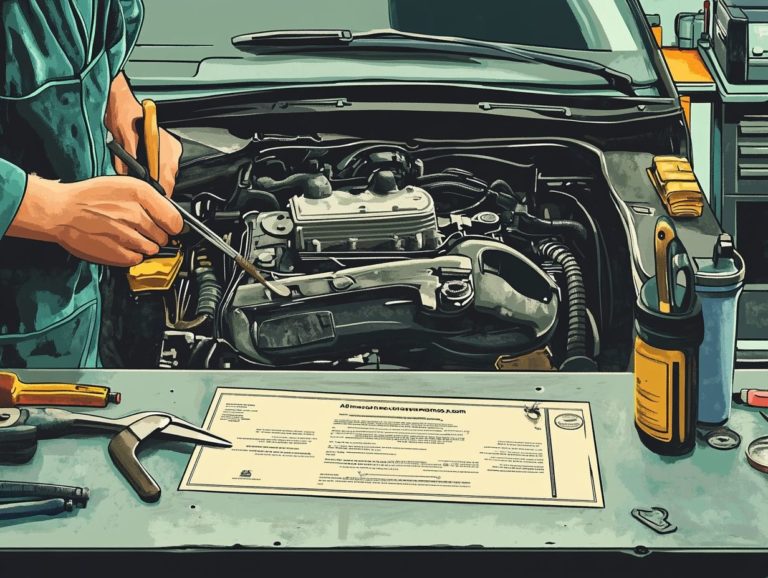Car Warranty: What to Look for in the Fine Print
Get ready to protect your investment! When you re in the market for a vehicle, grasping the nuances of car warranties is essential.
The journey through warranties can feel overwhelming, from basic definitions to the details that can influence your coverage. This article demystifies the various types of car warranties, highlights key factors to consider, and points out common pitfalls to avoid.
You ll be equipped to make the best choice for your vehicle!
Contents
- Key Takeaways:
- Understanding Car Warranties
- Key Factors to Consider
- Fine Print to Watch Out For
- How to Compare Car Warranties
- Frequently Asked Questions
- What is a car warranty?
- What should I look for in the fine print of a car warranty?
- What are the different types of car warranties?
- Do all car warranties cover the same things?
- Can I purchase a car warranty after buying a car?
- What happens if I don’t read the fine print of a car warranty and need to make a claim?
Key Takeaways:

- Make sure to carefully review the coverage and exclusions of a car warranty to understand what repairs are covered and what is not.
- Consider the length and mileage limitations of a car warranty to determine if it will provide sufficient coverage for your needs.
- Always pay attention to the fine print and watch out for common traps and loopholes that may limit your coverage or eligibility for repairs.
Understanding Car Warranties
Understanding car warranties is essential for you as a vehicle owner, especially if you want to protect your investment and steer clear of unexpected repair costs. A car warranty acts as an agreement, clearly outlining the specifics of your coverage what s included, what s excluded, the claims process, and the responsibilities of both you and the warranty provider.
With various types of warranties at your disposal, such as manufacturer and extended warranties, it s crucial to grasp the terms and conditions that dictate your coverage. This knowledge is invaluable in the automotive realm, as it helps you effectively reduce the risks of car breakdowns and mechanical failures.
What is a Car Warranty?
A car warranty is essentially a service contract that safeguards you from unforeseen expenses related to vehicle repairs, covering costs that arise from defects or mechanical breakdowns.
These contracts typically encompass specific components of your vehicle, including the engine, transmission, and electrical systems, ensuring you re not left to shoulder the financial burden of significant repairs alone. Warranty providers act as crucial intermediaries in this system, evaluating claims and authorizing the necessary repairs.
Much like an insurance policy, a car warranty brings you peace of mind by mitigating potential financial losses, kicking in when the covered parts fail or encounter issues within the agreed timeframe. This arrangement not only helps maintain your vehicle s performance but also preserves its value over time.
Types of Car Warranties
You have a variety of car warranties at your disposal, each crafted to cater to specific needs and varying levels of vehicle protection. These include extended warranties, manufacturer warranties, and powertrain warranties which cover essential components like the engine and transmission.
Specialized warranties are also available for certified pre-owned vehicles, typically providing a reassuring level of quality for buyers. Dealer warranties can offer extra protections, which may differ significantly from the original manufacturer’s terms. Aftermarket modifications can void certain aspects of a warranty.
Grasping the nuances of each warranty type gives you the power to make informed decisions that align perfectly with your ownership experience and enhance your peace of mind.
Key Factors to Consider
When you contemplate a car warranty, it s essential to assess several key factors that significantly impact the effectiveness of your coverage.
Pay close attention to the specifics of the coverage, warranty exclusions, and any limitations related to duration and mileage, as well as understanding the fine print of car loans, to ensure you make an informed decision that safeguards your investment.
Explore your options today and drive with peace of mind!
Coverage and Exclusions

Understanding what’s included in your car warranty and its exclusions is essential for avoiding costly pitfalls and ensuring you are protected against vehicle defects and unexpected repairs.
A comprehensive warranty offers peace of mind, but not all repairs will be covered. Common wear-and-tear items like brake pads and tires may be excluded, putting you at risk during routine maintenance. Problems with your car’s parts resulting from improper maintenance often won t be covered either, leaving you with the financial burden.
This highlights the importance of reviewing the fine print. By doing so, you can clearly see what is covered and what potential exclusions exist, giving you a clearer understanding of new car warranties and the protection your warranty truly provides.
Length and Mileage Limitations
Length and mileage limitations define your coverage duration and how far you can drive before the warranty becomes void.
These parameters outline the timeframe for repairs and serve as a valuable guide for your purchasing decisions. If you often drive long distances, choose a warranty with higher mileage limits to avoid unexpected costs.
Exceeding those limits can lead to hefty out-of-pocket expenses. For example, you could face a significant bill for a transmission repair if your vehicle surpasses the 50,000-mile threshold set by the warranty.
It s essential to evaluate your driving habits and select a warranty that aligns with your lifestyle, ensuring you remain protected in the future.
Transferability and Cancellation
The transferability and cancellation policies of your car warranty can greatly influence your ability to sell or modify your vehicle while still enjoying warranty benefits.
Understanding these policies is crucial, especially if you plan to transfer your warranty to a new owner during a sale. Some warranties allow for a seamless transfer, enhancing your vehicle’s appeal to potential buyers. However, keep in mind that this often comes with associated fees you ll need to consider.
If ownership changes through a trade-in or private sale, you may have to navigate the cancellation process to avoid complications with liability. This usually requires notifying the warranty issuer and following specific steps outlined in the warranty terms, ensuring everyone involved is aware of the status and coverage options available.
Fine Print to Watch Out For
The fine print in warranty agreements often contains pivotal information that can create common traps and loopholes. To avoid these issues, it’s crucial to understand car warranty comparisons and carefully examine these documents before signing.
Common Traps and Loopholes
Many car warranties hide traps and loopholes that make claims difficult. To navigate this, it’s important to understand what to keep in mind when purchasing a warranty, as you may encounter vague language that can lead to confusion about what is and isn’t covered.
For instance, certain conditions might be open to interpretation, putting you in a tricky spot when it’s time to make a claim. You might be shocked to discover exclusions like routine maintenance or specific types of damage that can strip away coverage when you need it most.
These pitfalls not only create confusion but can also dissuade you from pursuing valid claims, resulting in added frustration and unexpected expenses.
That’s why it s essential to meticulously scrutinize the warranty terms and fully understand what is covered. By doing so, you can avoid falling prey to these common issues and ensure that your investment is genuinely protected.
How to Compare Car Warranties

When comparing car warranties, adopt a strategic approach that emphasizes key elements. Focus on warranty requirements, ask important questions, and conduct thorough research to make the most informed decision for your vehicle protection needs.
Important Questions to Ask
Asking the right questions when exploring car warranties can greatly improve your understanding of warranty requirements and the coverage levels provided by different warranty providers.
This proactive approach equips you with crucial information. It also safeguards you against unexpected repair costs.
To achieve a comprehensive understanding of what the warranty entails, you should look into the specific types of coverage available, like powertrain which refers to the engine and transmission and bumper-to-bumper options.
Don’t forget to inquire about potential exclusions, such as wear-and-tear limitations or coverage on aftermarket parts parts that are not made by the original manufacturer as these can clarify what is not included.
You must ask about the claims process: how it operates, what documentation you ll need, and typical response times. These factors can significantly affect the warranty’s overall effectiveness and ease of use.
Researching and Negotiating
Researching and negotiating with warranty providers is vital in securing a car warranty that aligns with your needs while maximizing your consumer protection.
To achieve this, you should explore the various warranty options available in the market. Compare their coverage details, limitations, and exclusions.
Start by perusing online reviews and consumer reports that shed light on the experiences of other vehicle owners with specific providers. When you engage with warranty representatives, approach the conversation with clear objectives and a firm grasp of your requirements.
It s advantageous to ask about dealer add-ons, carefully considering their relevance and necessity for your vehicle’s protection. Ensure that any warranty you choose aligns with your long-term goals for maintenance and unexpected repairs, providing you with peace of mind for years to come.
Frequently Asked Questions
What is a car warranty?
A car warranty is a contract between the warranty provider and the car owner that outlines the terms and conditions for repair or replacement of certain parts of the vehicle within a specified time frame.
What should I look for in the fine print of a car warranty?
You should read and understand the exclusions, limitations, and coverage details in the fine print of a car warranty to make an informed decision. Understanding the importance of reading your car warranty will help you look for hidden fees, mileage restrictions, and specific conditions for coverage.
What are the different types of car warranties?
The two main types of car warranties are powertrain warranty and bumper-to-bumper warranty. A powertrain warranty covers major components such as the engine and transmission, while a bumper-to-bumper warranty covers most parts of the vehicle except for wear and tear items.
Do all car warranties cover the same things?
No, car warranties can vary significantly in terms of coverage. Some may have more comprehensive options, while others may have more exclusions and limitations. To make an informed decision, it’s important to know what to expect from a new car warranty and carefully review the fine print to understand what is covered under a specific warranty.
Can I purchase a car warranty after buying a car?
Yes, you can buy a warranty after purchasing a car. However, costs might be higher, and coverage could be limited. It’s best to research and purchase a car warranty before buying a car for the best options and pricing.
What happens if I don’t read the fine print of a car warranty and need to make a claim?
If you don’t read the fine print of a car warranty and make a claim for a repair or replacement, you may be surprised to find that the issue is not covered or that you have to pay additional fees. Being aware of the fine print of new car deals helps you avoid unexpected costs or denials of coverage.
Start your warranty research today and protect your investment!







